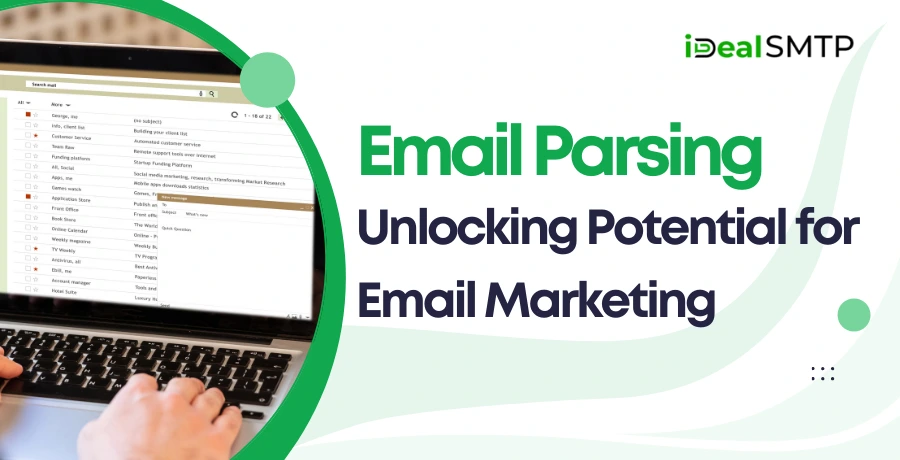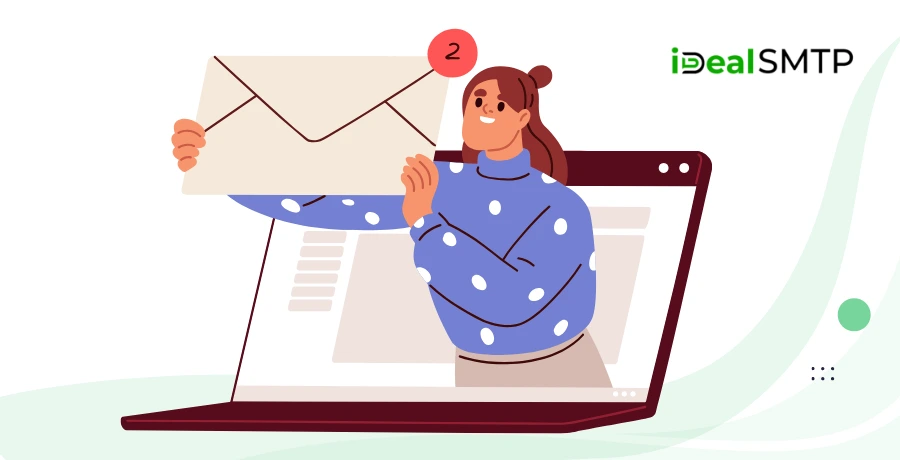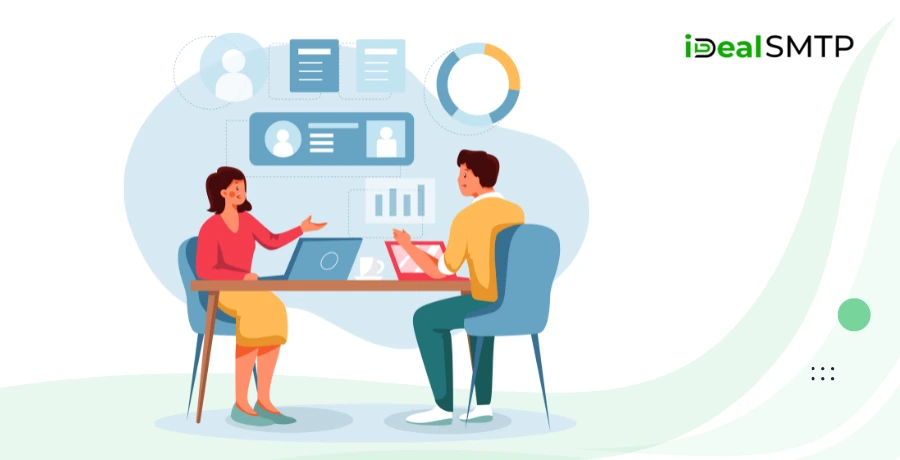In today’s fast-moving communications environment, email remains a fundamental tool for the business organization and the individual. Beyond the simple act of sending and receiving messages, lies a powerful and transformative process: email parsing.

This technology, combined with email marketing services, can enable the business to harvest, analyze, and incorporate data derived from emails in unique ways that can increase the effectiveness of email marketing.
Table of Contents
Pricing
| Trail Plan | Standard Plan | Premium Plan | Professional Plan |
| $50 | $145 | $185 | $225 |
| Sending Limit | Sending Limit | Sending Limit | Sending Limit |
| 1000 Emails/Hour | 1500 Emails/Hour | 3000 Emails/Hour | 5000 Emails/Hour |
What is Email Parsing?
Email parsing is a technique through which certain information is automatically extracted from received emails. Vision it as an automated filtration system for your emails that filters for certain specific pieces of information that you have identified as relevant, e.g., names, dates, order numbers, context information, etc., before placing this data into a more structured format.
This structured data can be easily incorporated into other systems or processes, information management systems such as CRM tools, databases, digital marketing platforms, etc.
The Importance of Email Parsing in Business
The total number of emails businesses receive daily makes manual processing of data impossible and unfeasible. Email parsing service providers and tools address this challenge by:
Improving Efficiency- The use of automated data extraction eliminates time-consuming manual data extraction thereby improving the rate of decision-making and action.
Reducing Errors- Typing data manually is very likely to result in errors. Email parsers help to achieve accuracy by exercising automatic control over the extraction process.
Enhancing Customer Experience- The short time taken to go through large volumes of data results in quick response and increased customer satisfaction.
Boosting Email Marketing Efforts- Consumers’ emails can be parsed to obtain information that will help the business market its products through emails, and enhance the chances of the emails being opened and, in the process, converting potential consumers.
Key Features of Email Parsing Tools
The most suitable email parsing tools should provide functionalities that make the data extraction process less rigorous. These include:
Customizable Parsing Rules- Determine according to your application’s needs what data should be extracted or what data is relevant.
Integration Capabilities- Integrate with customer relationship managers, databases, or some other platform to speed up operations.
Support for Various Formats- The emails can include bodies, attachments, headers, specific file formats, and even PDFs or spreadsheet documents.
Scalability- Operate with big amounts of messages and do not lose the capacity or the effectiveness of the process.
Popular Email Parsing Tools
There are important and affordable Smart email parsing tools available in the market to fit the different requirements of users. Here are some of the most popular options:

Zapier Email Parser- An easy-to-use software that supports an immense number of apps to create workflows in unison.
Mailparser.io- Focusing on parsing information from emails and their attachments useful for e-commerce and logistic companies.
Parserr- Connects well with tools such as Salesforce to provide valuable features thus making it suitable for the sales department.
Email2DB- A general-purpose email archiving tool that includes powerful data extraction and processing functions as well as special scripting capabilities to automate email analysis.
Integromat (now Make)- A strong automation tool that will parse your e-mail, great for detailed processes.
Applications of Email Parsing in Email Marketing
Email marketing is all about data, all about what is going to make a difference to the recipients of the messages being sent. Up-to-date information on customers results in targeting, segmentation, and personalization, and well-timed and developed successful campaigns.
Here’s how email parsing tools elevate email marketing efforts:
- Lead Management- Extract the lead’s contact information directly from the inquiry emails received and use the extracted data to follow up instantly from the CRM.
- Segmentation- We extract customer preference and past interaction data to build highly refined email segments.
- Order Management- Travel the information from the order confirmation emails to detect purchase specifics and then facilitate post-purchase communications.
- Event Tracking- Pars upcoming event registration emails and event communications to make attendee interactions and follow-up processes easier.
- Survey Feedback- Extract lessons from feedback emails to get ideas on how to better products or services.
Email Parsing Services: What to Look For
When selecting an email parsing service, consider the following factors:
Ease of Use- It should be self-explanatory to the degree that little training is needed.
Reliability- There should be an ability to find a provider with an appropriate history of overall uptime and stable work.
Data Security- It is imperative for the service to meet regulations and policies on data protection such as GDPR or CCPA.
Customization- Select a service that does not have strict rules for parsing and provides the opportunity to adjust it.
Cost-Effectiveness- Make sure to compare the prices in different plans to get optimum value for your money.
Steps to Set Up an Email Parser
Setting up an email parser involves the following steps:
- Identify Data Points- You should decide what data you are going to scrape for – this could be people’s names or emails, or the details of their orders.
- Choose a Parser- That means you select an email parsing tool or email service that performs optimally and tricks the email account into believing it is being used from the correct device at the correct time of day.
- Set Parsing Rules- Set parameters of data extraction. For instance, use keywords or patterns to search the email body.
- Test the Parser- Some activities include sending sample emails to make sure the parser is picking the right data.
- Integrate with Other Tools- For the ease of syncing your data with your CRM, marketing platform, or database, integrate the parser.
Real-Life Applications of Parsing Using Emails
To understand the practical benefits of email parsing, let’s explore some real-world examples:

- E-commerce- Parse customer acknowledgment emails to change inventories and create package tags.
- Customer Support- Automatically sort the contents of support ticket emails to place them into common categories and classify them as urgent or non-urgent, depending on how quickly they should be resolved.
- Recruitment- Scrap data from emails received for jobs and put information into recruitment databases.
- Travel Industry- Mine the confirmation emails of the booking made to automatically build the itinerary and notify the clients.
- Real Estate- Pull out properties from inquiry emails and make Listing and client communications more efficient.
The Future of Email Parsing
Given a continually progressive AI and Machine learning, there is potential for more advancement in the processing and parsing capacity of email parse tools. Emerging trends include:
Natural Language Processing (NLP)
Improving the parsers’ capability in analyzing difficult or untidy content of emails.
Real-Time Parsing
Increased efficiency to be able to meet an increasing need for user data on fast-changing processes.
Advanced Automation
Autonomous compatibility with other AI Marketing tools for predictive analysis and marketing Emails.
Enhanced Security Features
Enhanced encryption and compliance features to meet ever-growing concerns about the protection of personal data.
Challenges and Solutions in Email Parsing
As mentioned before email parsing has a lot of advantages, it is however not without its drawbacks. Common issues include:
Inconsistent Email Formats
There is no format for emails, and most of the time even the layout is not uniform; therefore, setting the parsing rules becomes challenging.
Solution: Apply methods of machine learning to work with changes in email structures.
Data Privacy Concerns
In the receipt and analysis of emails, there is always exposure to confidential information, and this leads to a consideration of the privilege question.
Solution: Work only with email parsing services that regulate the usage of a person’s data.
Integration Hurdles
Parsers can be integrated with existing systems which can be technically demanding.
Solution: Avoid the tools that do not offer detailed API documentation or that lack any support options.
Conclusion
It’s quite apparent that current approaches to email processing, that is the so-called email parsing, are rapidly changing the way businesses use e-mail data. Indeed, the use of email parsing tools and services can open a vast number of opportunities and reach from the simple automation of routine tasks to improving the key directions of organizations’ operations, such as email marketing service. If the appropriate solutions are bought and implemented into processes, then unparalleled effectiveness, precision, and satisfaction among customers can be achieved.
However, as the technology of parsing technologies advances its usage in the future of communication and marketing will only advance as well. Make no mistake about this, no matter the size of your business, big or small, it’s time to adopt email parsing now. Use this revolutionary weapon to have an edge over your competitors on the ever-evolving online platform.







